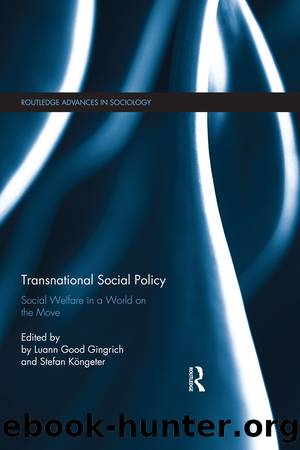Transnational Social Policy by Luann Good Gingrich Stefan Köngeter

Author:Luann Good Gingrich, Stefan Köngeter [Luann Good Gingrich, Stefan Köngeter]
Language: eng
Format: epub
ISBN: 9780367871543
Barnesnoble:
Publisher: Taylor & Francis
Published: 2019-12-10T00:00:00+00:00
Discussion
The global âdiscourse of needâ (Haney 2000, 51) introduced in ECE in the 1980s by well-dressed international aid agency executives was indeed evident in social policies and programs adopted by the Polish government in the early 1990s. From a pre-1989 system that the WB had identified as rooted in âpassivityâ and excessive levels of discretion, the LSA of 1990 redirected social welfare discourse from a focus on âsocial careâ provided by a paternalistic state, to one that emphasized provision of âsocial assistanceâ (World Bank 1993; Rymsza 2011). The new system was characterized by the devolution of an increasing number of tasks to local social assistance centres, in which social workers assessed client need and aided them in becoming âactiveâ and âself-reliantâ.
Managerialism has been characterized variously as a âmeans of making material the ideology or discourse of neoliberalismâ (Harlow et al. 2012, 536), and a type of âorganizational glueâ through which âneoliberal ideas are materialized or implementedâ (Clarke 2004, 128â129, in Harlow et al. 2012, 538). While in MSACâs Branch A professional managers had not replaced administrators who were trained social workers, features of managerialism can be identified in the organization of social assistance and social work in Big City in the early 2000s. Social workers were required to conduct lengthy in-home interviews with all claimants (including repeat claimants) to assess need and eligibility, regardless of the nature of the request. Indeed, this was not only laborious, but contributed to the âmountain of paperworkâ noted by one Branch A social worker. As Rogowski (2011, 163â164) observed in the context of the UK, the âdemise of relationship-based social work as bureaucratized work has taken over in the form of a series of one-off experiences in order to complete forms/exemplarsâ, with form filling and data input becoming the âbe all and end allâ of the work. Certainly, social worker Lidiaâs interaction with Ms. Nowakowska was little more than an attempt to gather the information necessary to complete the interview form. In the context of the pilot CCT/workfare programme, the two would no doubt meet on a more regular basis as Lidia monitored the womanâs job search. However, these interactions would likely focus on compliance with rules, rather than on establishing a relationship in which âpureâ social work might take place â such as attention to and assistance with Ms. Nowakowskaâs sonâs apparent abuse of alcohol.
Further, the focus on bureaucracy created stress for social workers in two ways. First, high caseloads, masses of paperwork, and the necessity of meeting relatively short deadlines placed social workers under a great deal of pressure. Researchers have revealed the tension arising from the assembly line nature of social workersâ interactions with clients in the context of social policy reform. Dlamini and Sewpaulâs (2015) study of South African social workers revealed the anxiety created by high numbers of cases and an extensive range of tasks; and Haney (2002) found that Hungarian social workers experienced significant amounts of stress following the introduction of means testing in the context of neoliberal restructuring of social welfare programs.
Download
This site does not store any files on its server. We only index and link to content provided by other sites. Please contact the content providers to delete copyright contents if any and email us, we'll remove relevant links or contents immediately.
1610396766 (N) by Jo Ann Jenkins(1294)
Whatever You Do, Don't Run by Peter Allison(1245)
Botswana--Culture Smart! by Michael Main(1234)
In Arabian Nights by Tahir Shah(1199)
Livingstone by Tim Jeal(1150)
The Old Farmer's Almanac 2020 by Old Farmer’s Almanac(1150)
Ubuntu by Ellis Heather;(1132)
The Templars by Michael Haag(1121)
Dead Eye by Mark Greaney(1101)
Africa: Altered States, Ordinary Miracles by Richard Dowden(1077)
Top 10 Israel and Petra by DK Travel(1067)
Morocco Travel Guide by Lonely Planet(1062)
The Promise of a Pencil: How an Ordinary Person Can Create Extraordinary Change by Braun Adam(1053)
Egypt Travel Guide by Lonely Planet(1050)
False Papers by André Aciman(1045)
First Comes Love, then Comes Malaria by Eve Brown-Waite(1039)
Jeff Corwin by Jeff Corwin(1028)
The Masked Rider by Neil Peart(985)
African Nights by Kuki Gallmann(964)
